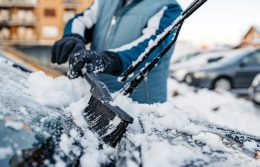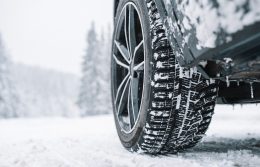Warm Up Your Engines
Winter weather is upon us. Along with colder temps, hot chocolate by the fire, and flannel clothing comes harsh driving conditions that can have serious effects on our daily commutes — not to mention the wear and tear the winter weather has on our vehicles. Last December, millions of North Texans were hit with blizzard conditions that left inches of ice on roadways, keeping folks indoors.
While we can’t predict what this year’s winter season has in store, we can do some things to prepare our cars for the colder weather. For starters, have your heating and cooling systems checked by a licensed professional. The antifreeze in the radiator should be filled and all hoses checked to ensure there are no cracks or leaks.
Changing temperatures also affect tire pressure. Because air is a gas, it expands and contracts when heated and cooled, so in winter months, tires can lose pressure, which can affect handling as well as reduce gas mileage. While checking the pressure, be sure to inspect the tires to verify they are not worn out and have good tread depth.
Speaking of tires, take a look at your spare. Fill it up if it is low and take the time to locate your car’s jack so you can get to it if needed while out on the road.
Cold weather can also be hard on a car’s battery. It’s a good idea to have a professional check the battery’s charge and fluid level as well as make sure the terminals and the battery itself are free of corrosion. Always keep jumper cables in your vehicle. If your battery dies, they’ll come in handy to get you to a service station, or you can help out a fellow motorist in need of a spark. According to Batteries Plus, there are two main reasons that winter weather is tough on car batteries. Number one, the engines are far harder to turn over because the oil inside them has thickened. This demands much more current from a battery. And two, the chemical reactions that generate electricity are slower at lower temperatures.
To keep the battery performing at its best during the winter, Batteries Plus suggests visually inspecting the battery, having older car batteries tested, and using a trickle battery charger to easily start the car each day. Park in a garage, if possible, to protect the battery from freezing temperatures and keep its power level up.
Make sure your windshield wiper blades are in good condition and keep your wiper fluid reservoir full of a fluid that won’t freeze. (Most wiper fluids have labels that detail their freezing points.) You should also keep some deicer on hand in case your blades become stuck to the windshield. Deicer can also be used to unstick doors or windows that have frozen shut.
If you haven’t already, it’s a good idea to pack an emergency roadside kit to keep in your trunk in case an issue with your automobile leaves you stranded. According to Consumer Reports, a kit should include blanket(s), work gloves, water (that’s changed out on a regular basis), ice scraper, deicer spray, road flares/reflectors, flashlight, extra batteries, a phone charger, a multipurpose tool such as a Swiss Army knife, a first-aid kit, a tow strap, a shovel, and a bag of cat litter. Cat litter can help your car gain traction if you are stuck; just sprinkle some under each tire.
A little homework and prep time now can help ensure your car will be operating efficiently and safely when the first winter snow or ice storm hits.
To keep safe when you head out on the road, the Texas Department of Transportation (TxDOT) offers the following winter driving safety tips:
- Reduce speed. Speed limits are based on normal road and weather conditions, not winter road conditions.
- Maintain at least three times the normal following distance on snow or ice.
- Watch carefully for snow removal equipment and stay at least 200 feet back if you are behind a snow plow.
- Use extra caution on bridges, ramps, overpasses, and shaded areas as they tend to freeze first.
- If you start to slide, ease off the gas pedal or brakes. Steer into the direction of the skid until you feel you have regained traction, then straighten your vehicle.
Finally, if you do become stranded, don’t panic. You can get help by contacting the Texas Department of Public Safety’s stranded motorist hotline at 800.525.5555.
Coverage and discounts are subject to qualification and policy terms and may vary by situation. Ⓒ 2014 Texas Farm Bureau Insurance



